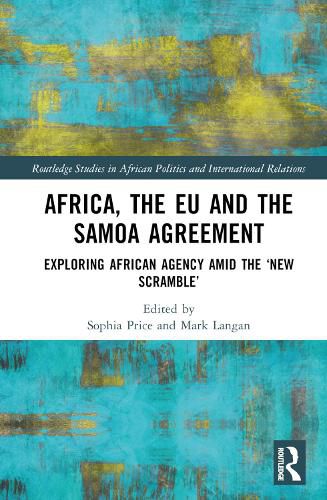Readings Newsletter
Become a Readings Member to make your shopping experience even easier.
Sign in or sign up for free!
You’re not far away from qualifying for FREE standard shipping within Australia
You’ve qualified for FREE standard shipping within Australia
The cart is loading…






This edited volume provides a timely and critical analysis of Africa-EU relations in the new Samoa Agreement phase of the long standing 'Eurafrican' relationship.
Drawing on a range of critical perspectives and contributions it moves beyond Eurocentric visions of policy co-operation on development to highlight three core themes that frame the analysis within the volume: the new scramble for Africa, Europe's ontological security and the securitisation of development and African agency. In doing so, it assesses EU actors' engagement with African institutions in relation to key areas of policy collaboration, including trade, development, health, migration, and security. In this context, it examines whether the 'partnership' offers African states and regional institutions a genuine pathway to 'development' or whether historical power asymmetries remain entrenched - and perhaps even exacerbated - through the new Africa-EU Agreement.
This book will be of key interest to scholars, students and practitioners involved in Development Studies, EU studies, Africa-EU Relations, African politics and International Relations, and more broadly to International Political Economy and Comparative Regionalism.
$9.00 standard shipping within Australia
FREE standard shipping within Australia for orders over $100.00
Express & International shipping calculated at checkout
This edited volume provides a timely and critical analysis of Africa-EU relations in the new Samoa Agreement phase of the long standing 'Eurafrican' relationship.
Drawing on a range of critical perspectives and contributions it moves beyond Eurocentric visions of policy co-operation on development to highlight three core themes that frame the analysis within the volume: the new scramble for Africa, Europe's ontological security and the securitisation of development and African agency. In doing so, it assesses EU actors' engagement with African institutions in relation to key areas of policy collaboration, including trade, development, health, migration, and security. In this context, it examines whether the 'partnership' offers African states and regional institutions a genuine pathway to 'development' or whether historical power asymmetries remain entrenched - and perhaps even exacerbated - through the new Africa-EU Agreement.
This book will be of key interest to scholars, students and practitioners involved in Development Studies, EU studies, Africa-EU Relations, African politics and International Relations, and more broadly to International Political Economy and Comparative Regionalism.